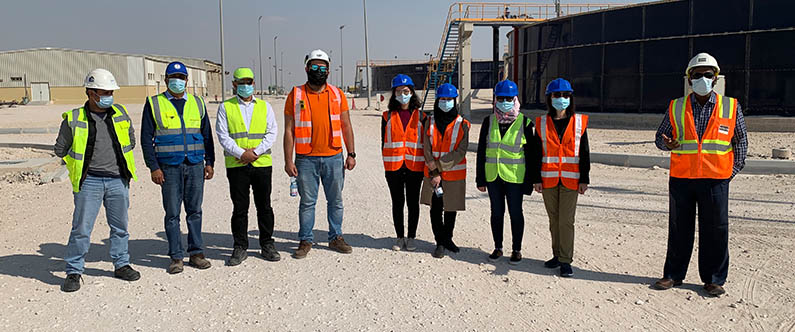WCM-Q students receive funding for ecology research
 The students visited the site with Dr. Kuei-Chiu Chen and Ashghal engineer Mohamad Khader (far right) to see how the wastewater is treated.
The students visited the site with Dr. Kuei-Chiu Chen and Ashghal engineer Mohamad Khader (far right) to see how the wastewater is treated.
Students at Weill Cornell Medicine – Qatar have received funding for their research cataloguing the biodiversity of lagoons created at a wastewater treatment plant.
The rehabilitation of Al Karaana Lagoons by the public works authority Ashghal began in 2017, augmented by a package domestic wastewater treatment plant in the vicinity. Since then, the area - which is approximately 60km south west of Doha off Salwa Road - has become a haven for wildlife and is particularly rich in bird life.
Mentored by the Division of Pre-medical Education’s associate professor of biology Dr. Kuei-Chiu Chen, students at WCM-Q will now document the flora and fauna found in the area and compare the statistics to those from 2015 and 2017 before the water was cleaned to such a high standard. The pre-medical students visited the site during the college’s winter break to see how the wastewater is treated and watch it be pumped into the lagoons, and have recently been awarded a grant from WCM-Q’s Student Research Mentorship Program to help them complete the study.
Ayaterahman Draidia, along with Momina Tareen and Nuran Bayaktar, is one of the students taking part in the study.
She said: “I had been looking forward to our trip to the treatment plant for a long time and it definitely was a great way to contextualise all the research we had made into the process by seeing with our own eyes. We first got briefed on the overarching waste decontamination process and the many steps required as the engineers explained how the entire plant functioned. Afterwards, we were given a tour of the entire plant, where we were able to take a close look at all of the different tanks and generators involved. We were taken through the entire process, following the waste as it arrived to the plant until the last stage - where we were shocked to see the final product looked as clear as drinking water.
“The main purpose of the study is to observe any changes in biodiversity of the Al Karaana lagoon after its environmental rehabilitation, which we will do by collecting data on various organisms, starting with birds. As a lifelong resident of Qatar, I was surprised by how little I knew about the country's bird population and how greatly I had underestimated its diversity.”
Ayaterahman said that she hoped the rehabilitation of the Al Karaana lagoon, and the work on monitoring any changes in biodiversity, will soon see it opened up to the public as an educational recreational area.
She added: “We expect that the success of the lagoon as a constructed wetland encourages such wetlands to be considered more often as viable methods of maintaining biodiversity. As of right now, our study is probably the only one of its kind in the entire Middle East and so we hope our paper encourages future research in the area on constructed wetlands.”
The cataloguing of the species at Al Karaana Lagoons will take place at both day and night and may demonstrate the importance of the lagoons for migratory birds. When Ashghal Public Works Authority conducted a study in September 2015, they found 48 bird species associated with the site, but this was before the water was treated to such a high standard to remove all contaminants.
Dr. Chen said it would be very interesting to see the results and was a valuable learning experience for the students involved.
She said: “Qatar is obviously a dry, desert country with no standing freshwater but it is on the flight path of thousands of migratory birds. It will be interesting to see how many species have started taking advantage of the lagoons as a resting point since their creation.
“From an educational point of view, the study will be an invaluable educational tool, introducing students to the concept for research and allowing them to take responsibility for it. I will be there to provide mentorship, but we really want them to take ownership of this research. As qualified doctors, WCM-Q expects them to conduct their own medical research and to embrace the ideas of lifelong learning and knowledge creation, so this is their first step towards that goal.”